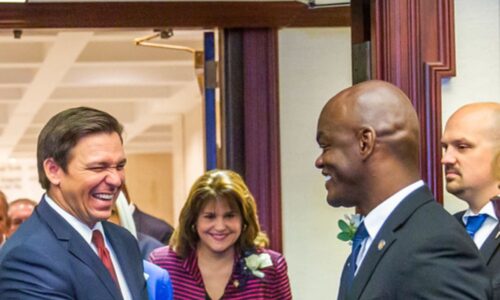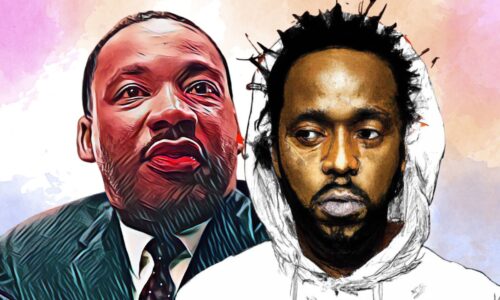 Anthony J Gaughan Anthony J GaughanDrake University; |
 Andra Gillespie Andra GillespieEmory University |
 Jennifer Stromer-Galley Jennifer Stromer-GalleySyracuse University |
The Democrats’ first debate took place in Las Vegas on Tuesday evening.
Compared to the two GOP debates, this CNN-hosted debate was more substantial and less impolite.
Here’s an instant analysis from three political scholars.
A decisive victory for Clinton
Anthony Gaughan, Drake University
Hillary Clinton gave a commanding performance in the first Democratic presidential debate. Both stylistically and substantively, she reminded voters of why the Clinton brand is still such a formidable force in American politics. After Tuesday night’s debate, there can be no doubt that Hillary Clinton is the prohibitive favorite to win her party’s presidential nomination.
Clinton desperately needed a strong showing in the Las Vegas debate. She’s had a tough six-month stretch. Her problems began with a self-inflicted scandal over the private email server she foolishly used as secretary of state. It took months of denials and evasions before Clinton finally admitted that setting up the server was a mistake. In the process, she reminded voters of everything they didn’t like about her husband’s scandal-plagued presidency. Over the summer, her poll numbers fell so sharply that Vermont Senator Bernie Sanders now leads Clinton by 16 points in the latest New Hampshire polls.
But on Tuesday night Clinton bounced back with vigor. She gave clear and concise answers and exuded strength and intelligence throughout the evening. After the Las Vegas debate, Clinton won’t trail in New Hampshire for long.
Substantively, Clinton kept Sanders – her only serious challenger – on the defensive. Clinton criticized the Vermont senator’s long history of voting against gun control measures like the Brady Bill. Clinton realizes that Democratic primary voters won’t think so highly of Sanders when they learn more about his voting record on guns and immigration, a track record that is anything but liberal.
Remarkably, Sanders later came to Clinton’s defense when CNN’s Anderson Cooper, the debate moderator, pressed Clinton on the email issue. Frustrated by Cooper’s questions, Sanders blurted out: “Enough of the emails!” The 1,300 spectators in the audience responded with thunderous applause, a good sign indeed for Clinton. Like Sanders, Democratic primary voters don’t want to hear anything more about the email controversy.
In the end, Clinton was simply better prepared and more polished than the other candidates. Smiling, relaxed, and confident, Clinton clearly felt comfortable under the white hot spotlight of CNN’s cameras. Indeed, she looked far more presidential than anyone else on the stage with her.
Most important of all, the Las Vegas debate provided a powerful argument that Vice President Joe Biden should stay out of the race. The first votes won’t be cast until the Iowa Caucuses on Feb. 1, but after Tuesday night, Hillary Clinton is undeniably in command of the Democratic nomination race. If Clinton keeps her momentum going, no other Democratic candidate stands a chance against her.
Anthony Gaughan is an associate professor of law at Drake University in Des Moines, Iowa. An expert on election law and American political history, he has published articles in a wide variety of academic journals, including the Journal of Supreme Court History, the American Journal of Legal History, the Kansas Journal of Law & Public Policy, the Texas Journal on Civil Liberties & Civil Rights, the Arkansas Law Review, the Journal of Southern History and Civil War History.
Sanders and the politics of frustration
Andra Gillespie, Emory University

The debate audience was warm to Sanders.
Lucy Nicholson/REUTERS
This was essentially a debate between Bernie Sanders and Hillary Clinton. The other candidates were merely along for the ride.
The debate did provide insight into why Bernie Sanders is such an appealing candidate. He clearly articulated his frustration with Wall Street, income inequality and the power of moneyed special interests. This message attracts voters who perceive that they work harder and harder for less and less.
Sanders and GOP candidates Donald Trump, Ben Carson and Carly Fiorina have been able to tap into veins of fear and anxiety in the American electorate. Pew reports that majority of Americans still perceive the economy to be soft and think that the economy favors the interests of the wealthy.
Sanders has clearly tapped into a nerve. However, that may not translate into primary or general election votes. For instance, while respondents to the Pew survey expressed concern about the state of the economy, they also believed that government had done little to solve these problems. Democrats have to face the reality that voters may view their proposals for government intervention with skepticism.
Sanders has to consider the problem of electability in the general election. He was a strong advocate for his version of democratic socialism in this debate, but his message may not win over centrist voters who still believe in the American Dream.
Andra Gillespie is an associate professor of political science at Emory University. She teaches introductory American and African-American politics and an occasional course called “New Black Political Leadership.” She is the author of The New Black Politician: Cory Booker, Newark and Post-Racial America.
Candidates shine on social
Jennifer Stromer-Galley, Syracuse University
Donald Trump not only took the oxygen out of the other Republican campaigns this summer but the Democratic ones, too. With the exception of Hillary Clinton and Bernie Sanders, few Americans know the names – let alone the policy positions – of the other viable Democratic candidates.
Debates are a media event that drives the public’s attention to the presidential race. That attention in turn generates money, which is the lifeblood of a presidential campaign.
Especially now, campaigns need money. Now is when the race gets really expensive as campaigns start to rent campaign field offices, hire more staff and air commercials on TV and the internet in early voting states.
As a media event, television has historically driven the attention of the public. But, in the age of digital media, there is a whole array of new communication platforms for campaigns to capitalize on. The lesser-known Democratic candidates, Lincoln Chafee, Jim Webb and Martin O’Malley, were active on Twitter and Facebook during the debate, aiming to reach a mass audience through fragmented digital means. Chafee even plugged his website in closing statements, using a strategy that goes back to the 2000 presidential campaign to drive money and supporters.
Hillary Clinton and Bernie Sanders also need to play the money game. Although both are raising unprecedented heaps of cash this early in campaign season, both still need massive war chests to survive the primaries.
Both used their social media platforms to echo the image and policy message they pushed during the debate. Hillary pushed her depth of experience, credentials and plans for affordable college. Sanders pushed his progressive image and reinforced his message of a revolution to save the middle class. Of the two, only Sanders made the challenger’s move to urge people to visit his website and contribute to his campaign, suggesting Clinton holds the strategic position of incumbent and front-runner.
Although Donald Trump didn’t ultimately get on the debate stage tonight, he still commanded a digital stage of his own, live-tweeting the debate, trying still to keep all the oxygen for himself.
Jennifer Stromer-Galley is an associate professor in the School of Information Studies and director of the Center for Computational and Data Sciences at Syracuse University. Her book Presidential Campaigning in the Internet Age provides a history of presidential campaigns as they have adopted and adapted to digital communication technologies.
![]() Anthony J Gaughan, Associate Professor of Law, Drake University; Andra Gillespie, Associate Professor, Political Science , Emory University, and Jennifer Stromer-Galley, Associate Professor of Information Studies, Syracuse University
Anthony J Gaughan, Associate Professor of Law, Drake University; Andra Gillespie, Associate Professor, Political Science , Emory University, and Jennifer Stromer-Galley, Associate Professor of Information Studies, Syracuse University
This article was originally published on The Conversation. Read the original article.




